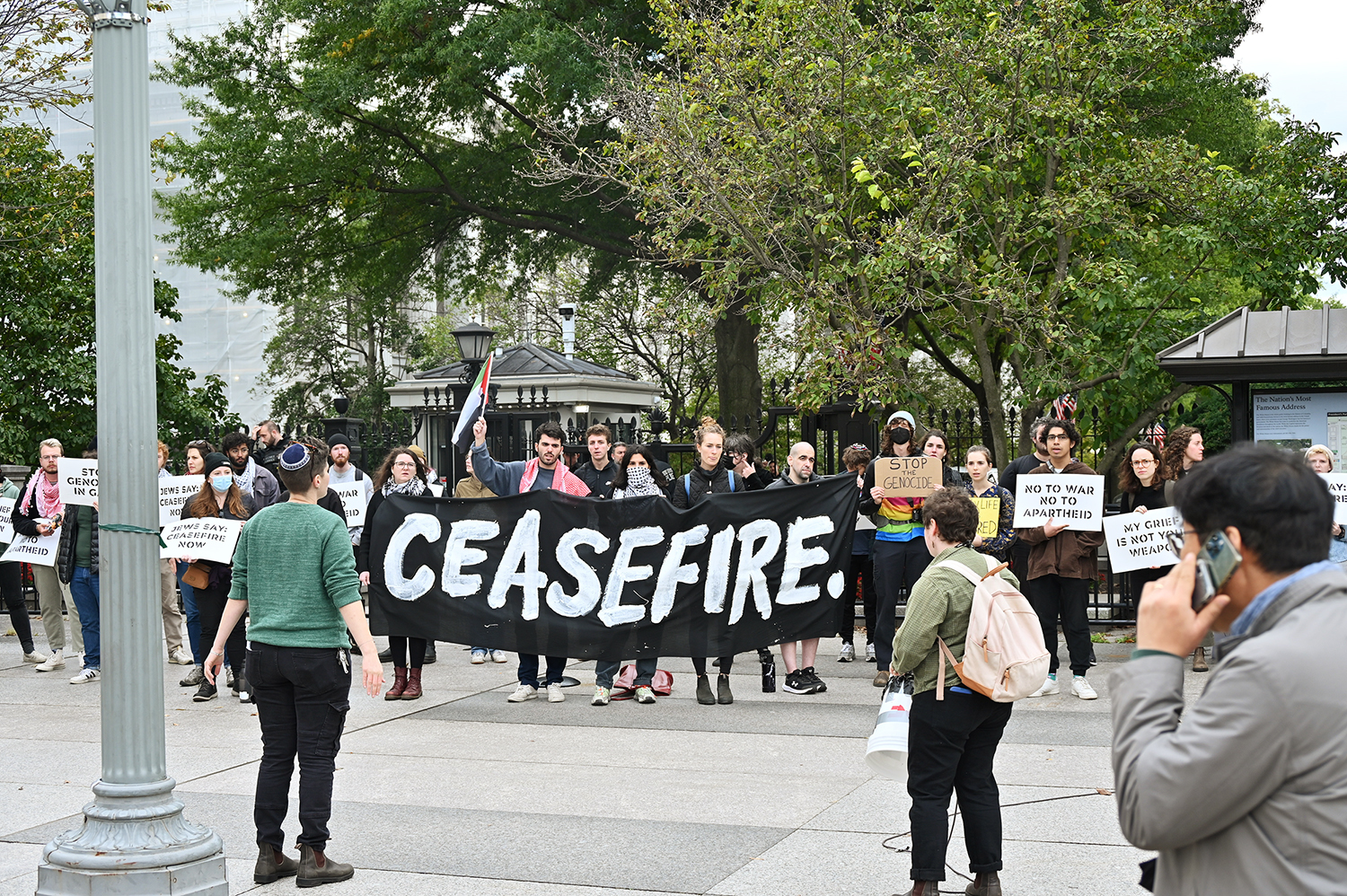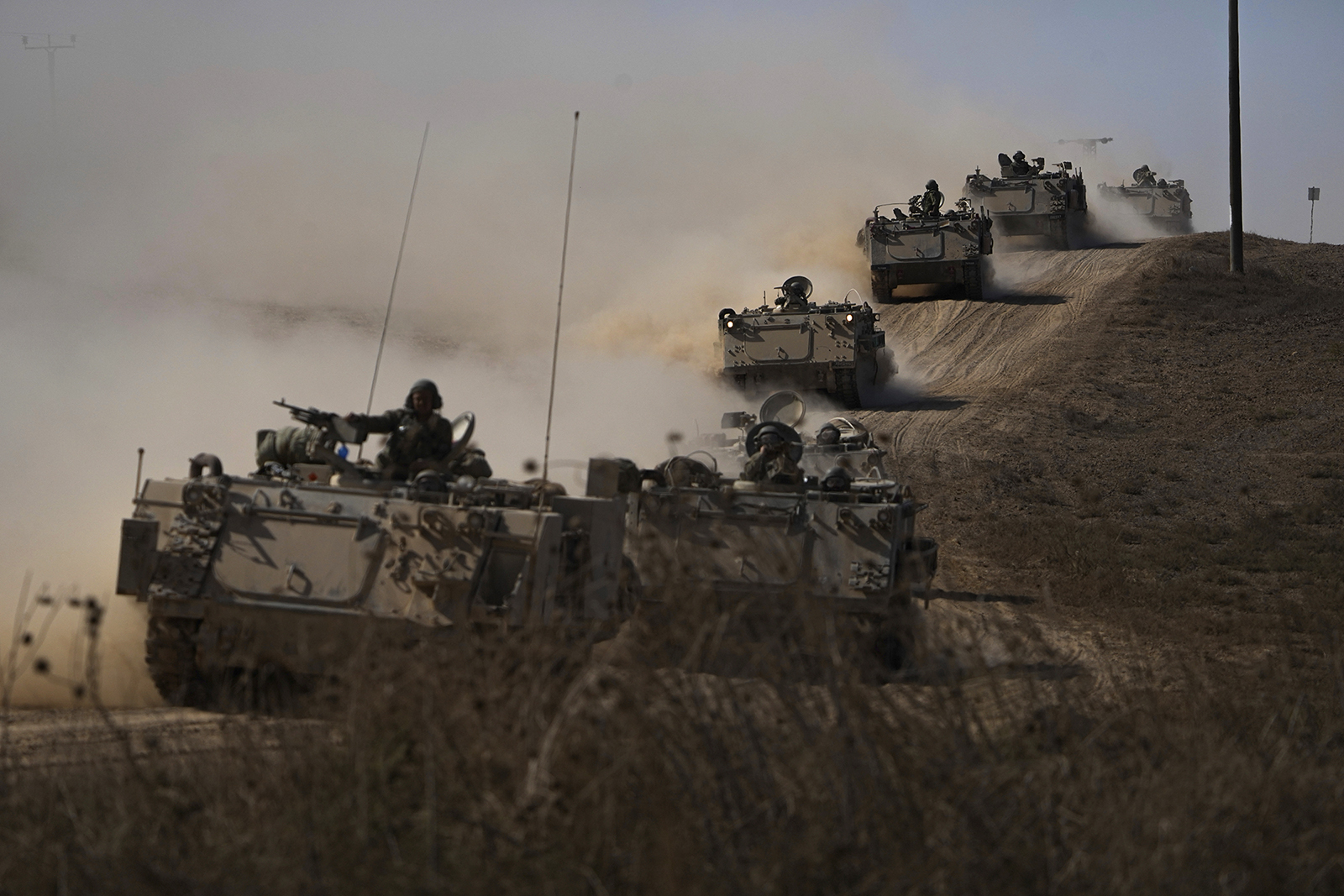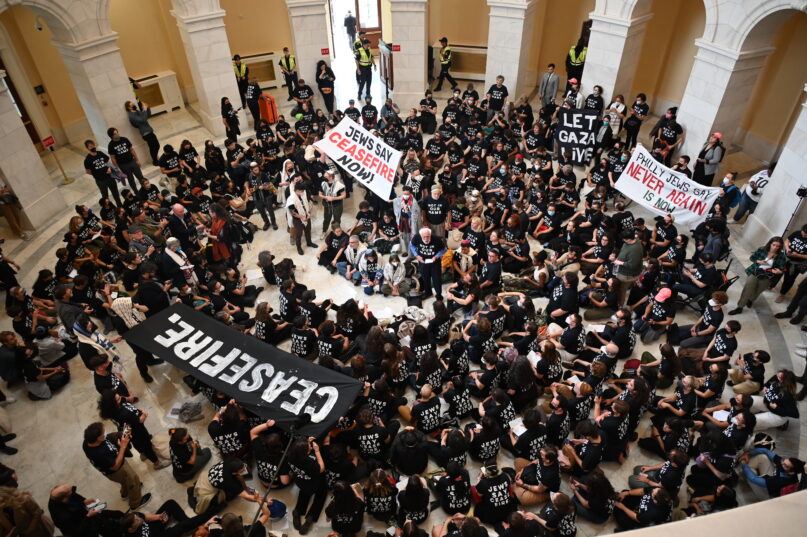(RNS) — Hamas’ Oct. 7 attack on Israel broke the hearts of American Jews everywhere. Now it’s also tearing them apart.
The incredible loss of life from the attack and the ongoing Israeli retaliatory airstrikes in Gaza have ignited anew a long-simmering battle between those Jews who stand unequivocally with Israel and those Jews who are critical of Israeli government policy and support Palestinians.
Israeli Jews experienced extreme trauma on Oct. 7 — the worst single-day massacre of Jews since the Holocaust, with a death toll of 1,400 mostly civilians and some 220 hostages taken to Gaza. Many of their American co-religionists have rushed to their aid. The Jewish Federations of North America raised $554 million for its Israel Emergency Campaign. Many Jewish leaders have flown to Israel to show their solidarity. “I stand with Israel” signs, hashtags, T-shirts, bracelets have become ubiquitous.
Hadassah, the American Jewish volunteer women’s organization, decided the moment was right for an “Inspire Zionism” two-day online conference that drew more than 900 participants to discussions in which American and Israeli Jews expressed their pride and commitment to Israel.
But other American Jews, long critical of the Israeli government’s policies toward Palestinians, have called for a cease-fire in Israel’s ongoing bombing of the Gaza Strip, which has killed as many as 6,500 Palestinians. These Jews have opposed any kind of military intervention in response to the Hamas killings and called Israel’s response a “genocide” of Palestinians.
“I think that progressives, certainly young Jewish progressives, see the moral and political necessity of taking every single action we can, in this time, to bring about a cease-fire and an end to violence,” said Stefanie Fox, executive director of Jewish Voice for Peace, which along with the Jewish group If Not Now organized two protests on Capitol Hill last week calling for a cease-fire. Hundreds of protesters, the majority Jewish, were arrested.

Signs and banners called for a cease-fire as demonstrators joined together in opposition to the ongoing conflict in the Middle East. The group gathered Oct. 16, 2023, in front of the White House. (RNS photo/Jack Jenkins)
That has inflamed American Jews on the right and in the center who believe Israel must defend itself in response to the devastating assault on its civilians.
Pro-Israel groups have denounced left-leaning Jews, accusing them of being antisemitic and not really Jewish. At least one former New York state assemblyman has called for them to be excommunicated.
“You have the right-wing position, which, as far as I can tell, is basically saying that any criticism of Israel right now should be totally off-limits,” said Emily Tamkin, a journalist and author of “Bad Jews: A History of American Jewish Politics and Identities.”
That is increasingly the view of the Jewish-founded Anti-Defamation League, which tracks antisemitism and hate speech. On Wednesday (Oct. 25), it reported 312 U.S.-based antisemitic incidents since the Hamas incursion into Israel. Notably, the ADL counted as antisemitic several “anti-Israel” demonstrations, some organized by Jews.
RELATED: Jewish-led demonstrations for Gaza cease-fire see hundreds arrested at Capitol
Jonathan Greenblatt, the ADL’s CEO, has blasted Jewish protesters on social media, in keeping with his long-standing view that anti-Zionism equals antisemitism.
“These radical far-left groups don’t represent the Jewish community. Far from it,” Greenblatt posted to X (formerly Twitter). He went on to accuse one of the groups — Jewish Voice for Peace — of being a hate group, and suggested the demonstrators — who included multiple rabbis — were antisemitic.
Increasingly, any calls for a cease-fire in the conflict are viewed as beyond the pale.
“This idea of a ceasefire — and let Hamas continue to exist so they can do it again? Nuh-uh,” Senate Majority Leader Chuck Schumer, who is Jewish, said in an interview with Punchbowl News.

Israeli tanks head toward the Gaza Strip border in southern Israel on Oct. 13, 2023. (AP Photo/Ariel Schalit)
The Boston Workers Circle, a progressive Jewish group that participated in a rally calling for a cease-fire and accusing Israel of “genocide,” was forced to resign from a local Jewish umbrella organization, saying it was told it would be expelled if it didn’t.
“We cannot support those organizations that demonize Israel, hold Israel to a double standard, and ignore the safety and security of Israel and our community as a whole,” said Jeremy Burton, executive director of the Jewish Community Relations Council of Boston, the umbrella group that threatened disciplinary action against the Boston Workers Circle, the Jewish Telegraphic Agency reported.
This war of words between Jewish groups on the right and the left is not new.
“Since the birth of the Zionist movement in the end of the 19th century, the Jews who did not support the Zionist project or had serious questions about the feasibility of a Jewish state were accused of being bad Jews, and it’s just taken on greater venom,” said Hasia Diner, a historian of American Jews. “The language has escalated and since there are more and more Jews who are raising serious questions about Israeli policy and of the rights of Palestinians, there are therefore, more people who get labeled antisemitic.”
After Prime Minister Benjamin Netanyahu assembled a governing coalition anchored by ultranationalist parties late last year, some left and centrist American rabbis began to speak more critically of Israel.
Rabbi Sharon Brous of Los Angeles’ IKAR congregation, for example, warned in a Yom Kippur sermon that Israel’s new right-wing government harbors a messianic agenda that aims to turn the country into a fascist theocracy.
The attack on Israel has muted some of these criticisms. Many mainstream Jewish groups have unequivocally blamed Hamas for the attacks and made it clear that they didn’t think Israel’s occupation of Palestinian lands or the 16-year blockade of Gaza could in any way justify a massacre of mostly Israeli civilians, including children and elderly people. They also note Hamas’ stated call for the destruction of Israel.
“Their position is that Israel has a right to wage war against Hamas to defend itself, but it has to conduct that war according to international law and the laws of armed conflict,” said Dov Waxman, professor of Israel studies at UCLA, speaking of mainstream, centrist Jewish groups.
Younger Jews, however, are increasingly reluctant to support Israel’s policies toward Palestinians and many don’t believe a military response will resolve anything.
According to a 2020 Pew survey, roughly half of American Jews aged 50-64 or 65 and older agreed that caring about Israel is essential to what it means to be Jewish. Among those aged 18-29, only 35% said the same.
That growing detachment from Israel may be most evident on college campuses. Brandeis University’s student government senate on Wednesday rejected a resolution condemning Hamas. The university was founded by Jews and about 35% of its undergraduates identify as Jewish.
In response, the ADL sent a letter to 200 universities asking them to investigate
the activities of Students for Justice in Palestine for potential violations of the prohibition against materially supporting a foreign terrorist organization.
For now, said Waxman, the space for dissent against Israel and Israeli government policies “is narrowing.”
“There is a kind of self-censorship that’s happening,” Waxman said. “You’re seeing much more of an intolerant attitude toward Jewish dissenters and Jewish critics of Israel’s military actions.”
RELATED: Israeli, Palestinian, Muslim or Jewish: Some pain doesn’t fit the story we want to hear





